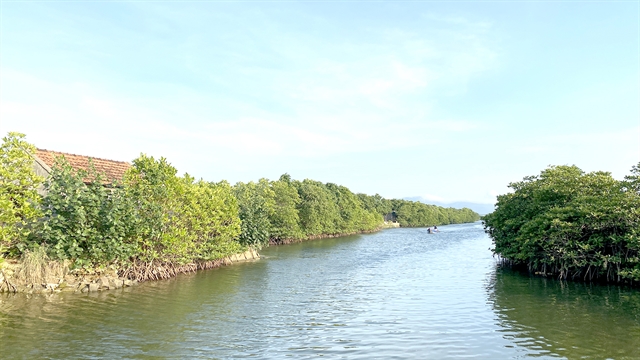 Environment
Environment

This initiative aims to boost centralisation, transparency, and overall efficiency in managing related transactions, according to Tăng Thế Cường, Head of the Department of Climate Change under the Ministry of Natural Resources and Environment.

|
| A mangrove forest in Quy Nhơn Province. VNA/VNS Photo |
HÀ NỘI — In light of Việt Nam's projected generation of approximately 10.8 million voluntary carbon credits annually, there is a growing demand for efficient exchange and purchase mechanisms, prompting active discussions about the establishment of a domestic carbon credit exchange.
This initiative aims to boost centralisation, transparency, and overall efficiency in managing related transactions, according to Tăng Thế Cường, Head of the Department of Climate Change under the Ministry of Natural Resources and Environment.
The initiative holds significant importance as it serves as a "green key" for Việt Nam in achieving its "Net Zero" target and ultimately striving for net zero emissions by 2050.
In line with the goal of reaching Net Zero by 2050, the Ministry of Natural Resources and Environment is actively developing a Scheme for the Development of a Domestic Carbon Market. This scheme places emphasis on the mandatory trading of GHG emission quotas for industries and businesses within the domestic carbon market, while also considering international market integration.
The roadmap for this project outlines the commencement of piloting by 2025, with the official operation of a carbon credit exchange by 2028.
Cường stressed the necessity for thorough preparation in terms of infrastructure, techniques, inventory capacity, and corporate reporting to successfully implement the aforementioned plan.
According to statistics, a total of 1,912 enterprises across the country are required to conduct greenhouse gas emission inventories and meet specific emission quotas. As a result, the Ministry of Natural Resources and Environment is set to advise the Prime Minister on approving Việt Nam's overall emission quota for the period 2026-2030 and annually thereafter.
This endeavour reflects the commitment of businesses towards reducing greenhouse gas emissions, with foreign investors and countries actively seeking collaboration with Việt Nam to implement projects that can generate carbon credits and align with the Paris Agreement on climate change. Such projects offer a valuable source of credit for transactions, Cường said.
According to Nguyễn Hồng Loan, Head of the Advisory Board for the construction and operation of the voluntary carbon credit exchange Currently, Việt Nam has four existing carbon credit mechanisms, including the Clean Development Mechanism (CDM), Joint Credit Mechanism (JCM), Gold Standard (GS), and Verified Carbon Mechanism (GCS).
The total number of carbon-related credits issued in Việt Nam as of December 2022 is about 40 million, with approximately 50 projects seeking issuance of carbon credits under the Global Carbon Council (GCC) mechanism. Notably, CDM and JCM are managed by state agencies.
“With the remaining mechanisms, the credit holder bears the responsibility of reporting to the appropriate management agency for synthesis. The establishment of a domestic carbon market with an exchange will significantly enhance the centralisation, transparency, and efficiency of transactions involving carbon credits,” Loan said,
Regarding the roadmap for managing all carbon credits, Nguyễn Văn Minh, Head of the Economic and Information Unit of the Department of Climate Change, said that the Ministry of Natural Resources and Environment will soon create a national registration system. Under this system, all businesses and organisations generating carbon credits in Việt Nam will be required to register their credits.
Furthermore, any transactions with foreign exchanges must be reported to the management agency, the Ministry of Natural Resources and Environment, as such activities impact the national emission reduction targets.
Setting clear short-term goals
Nguyễn Thuý Hạnh, Deputy General Director of Standard Chartered Bank, emphasises that the establishment of a voluntary carbon credit market is a crucial direction for Việt Nam to achieve its ambitious net zero emissions target by 2050.
Việt Nam's potential as a developing market is evident, but to attract Foreign Direct Investment (FDI) capital, Vietnamese enterprises and their supply chains must embrace a green and sustainable approach.
From a banking perspective, Hạnh highlights that they are committed to providing sustainable development products and services while offering free advice to businesses with new investments or plans to reduce emissions.
The global demand for voluntary carbon credits has been surging, and Việt Nam is no exception to this trend. In Việt Nam, carbon credit projects are predominantly implemented through pre-purchase contracts, where the party in need places an order.
Drawing from Singapore's experience in building and operating a carbon credit exchange, Mark Glossoti, Chief Operating Officer at Climate Impact X, advises Việt Nam to establish clear short, medium, and long-term goals. While these targets may need adjustment due to market uncertainty, taking the initial steps is essential, he said.
Furthermore, Glossoti stresses the importance of anticipating the development of the carbon market over time and allocating necessary resources for establishing the exchange.
Recent developments show that Prime Minister Phạm Minh Chính has requested the Ministry of Finance and the Ministry of Natural Resources and Environment to develop a decree on carbon credit management, to be submitted to the Government in the second quarter of 2024.
Additionally, the Ministry of Natural Resources and Environment has been assigned to lead and collaborate with the Ministry of Agriculture and Rural Development and other relevant agencies to seek insights from other countries' experiences. VNS




